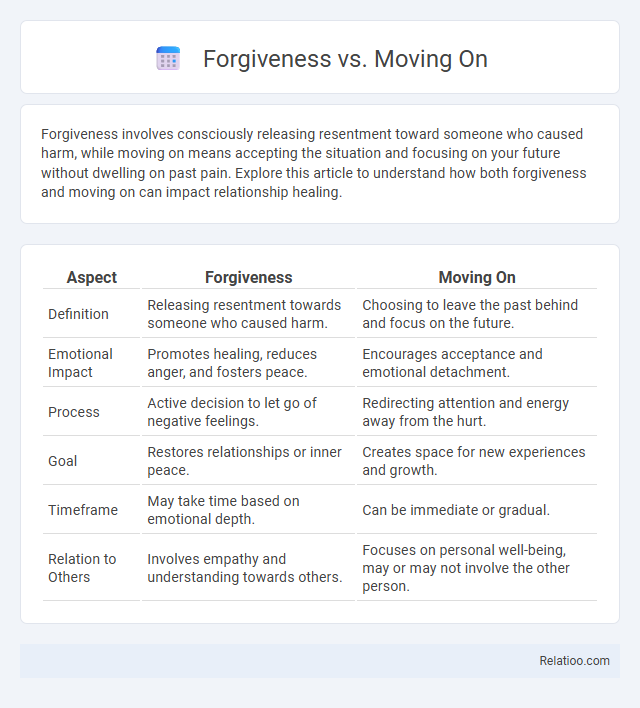Forgiveness involves consciously releasing resentment toward someone who caused harm, while moving on means accepting the situation and focusing on your future without dwelling on past pain. Explore this article to understand how both forgiveness and moving on can impact relationship healing.
Table of Comparison
| Aspect | Forgiveness | Moving On |
|---|---|---|
| Definition | Releasing resentment towards someone who caused harm. | Choosing to leave the past behind and focus on the future. |
| Emotional Impact | Promotes healing, reduces anger, and fosters peace. | Encourages acceptance and emotional detachment. |
| Process | Active decision to let go of negative feelings. | Redirecting attention and energy away from the hurt. |
| Goal | Restores relationships or inner peace. | Creates space for new experiences and growth. |
| Timeframe | May take time based on emotional depth. | Can be immediate or gradual. |
| Relation to Others | Involves empathy and understanding towards others. | Focuses on personal well-being, may or may not involve the other person. |
Understanding Forgiveness vs Moving On
Understanding forgiveness involves recognizing and releasing resentment toward those who caused hurt, promoting emotional healing without necessarily reconciling. Moving on emphasizes shifting focus away from past pain to rebuild one's life, which may occur with or without forgiveness. Both concepts serve distinct psychological purposes: forgiveness fosters inner peace, while moving on facilitates progress and adaptation to new circumstances.
Key Differences Between Forgiveness and Moving On
Forgiveness involves consciously choosing to release resentment or anger toward someone who has caused harm, focusing on emotional healing and restoring inner peace. Moving on, however, emphasizes detaching from the past and redirecting your energy toward new experiences without necessarily resolving feelings of hurt. Your path to closure may combine both, yet forgiveness centers on emotional reconciliation while moving on prioritizes forward momentum and personal growth.
Emotional Impact of Forgiving vs Letting Go
Forgiving releases emotional burdens by fostering empathy and reducing resentment, leading to inner peace and improved mental health. Moving on focuses on detaching from past pain without necessarily resolving underlying emotions, promoting resilience but sometimes leaving unresolved feelings. Your emotional well-being benefits most when forgiveness allows healing, while moving on supports strength by prioritizing future growth over past grievances.
The Psychology Behind Forgiveness
Forgiveness involves a deliberate decision to release feelings of resentment or vengeance toward a person or situation that has caused harm, which can lead to emotional healing and reduced stress. Moving on emphasizes detaching from the past without necessarily resolving emotional pain, often prioritizing personal growth and future well-being. Closure, distinct from forgiveness, entails achieving a sense of resolution or understanding that helps an individual reconcile with the event and integrate the experience into their life narrative.
Is It Possible to Move On Without Forgiving?
Moving on without forgiving is possible, but it often leads to lingering emotional pain and unresolved resentment that can affect your well-being. Forgiveness releases negative feelings tied to past events, enabling true healing and personal growth, while closure provides a sense of finality and understanding. Your ability to move forward depends on how you process these emotions, even if forgiveness has not yet been granted.
Benefits of Practicing Forgiveness
Practicing forgiveness offers profound emotional healing by reducing stress and promoting mental well-being, which supports your overall health. Forgiveness fosters healthier relationships by freeing you from resentment and enabling personal growth. Embracing forgiveness leads to inner peace and empowers you to move on from past hurts with a sense of closure.
When Moving On is Healthier Than Forgiving
Moving on is healthier than forgiving when holding onto past pain hinders your emotional well-being and personal growth. Forgiveness can sometimes keep you emotionally tethered to the source of hurt, whereas moving on allows you to reclaim your peace and focus on your future. Choosing to move on empowers you to set boundaries, prioritize your mental health, and create a life free from the burden of unresolved conflicts.
Steps to Achieve True Forgiveness
True forgiveness involves acknowledging the pain caused, accepting emotions without judgment, and consciously deciding to let go of resentment. Engaging in empathetic understanding towards the offender and practicing self-compassion are critical steps to release emotional burdens. Finalizing forgiveness requires consistent reflection and reaffirmation, ensuring emotional healing and preventing lingering bitterness.
Recognizing Unhealed Wounds While Moving On
Recognizing unhealed wounds while moving on involves acknowledging unresolved emotions that hinder true progress and personal growth. Forgiveness does not always equate to closure, as closure requires a conscious decision to accept the past and find peace within oneself. Understanding the distinction between forgiving and truly moving on empowers individuals to heal deeply and avoid repeating emotional patterns.
Which Path is Right For You: Forgiveness or Moving On?
Choosing between forgiveness and moving on depends on personal emotional goals and the nature of the hurt experienced. Forgiveness often involves releasing resentment and can foster inner peace and reconciliation, while moving on focuses on emotional detachment and creating distance without necessarily resolving underlying feelings. Evaluating whether seeking closure through forgiveness aligns with your well-being or if moving on offers a healthier boundary is essential for emotional healing.

Infographic: Forgiveness vs Moving On
 relatioo.com
relatioo.com